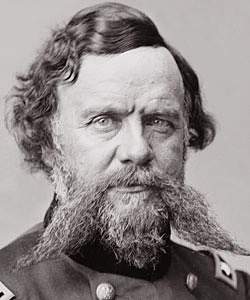Alpheus Starkey Williams (Congressional Biographical Directory)
Reference
WILLIAMS, Alpheus Starkey, a Representative from Michigan; born in Saybrook, Middlesex County, Conn., September 20, 1810; was graduated from Yale College in 1831; studied law; was admitted to the bar in 1837 and commenced practice in Detroit, Mich.; judge of probate 1840-1844; editor of the Detroit Daily Advertiser 1843-1847; served in the war with Mexico; commissioned lieutenant colonel of the First Michigan Infantry December 8, 1847; mustered out July 29, 1848; postmaster of Detroit 1849-1853; commissioned brigadier general of Michigan Volunteers April 24, 1861, and of United States Volunteers May 17, 1861; brevetted major general of Volunteers January 12, 1865; mustered out January 15, 1866; unsuccessful nominee for Governor of Michigan in 1866; Minister Resident to San Salvador 1866-1869; elected as a Democrat to the Forty-fourth and Forty-fifth Congresses and served from March 4, 1875, until his death in Washington, D.C., December 21, 1878; chairman, Committee on District of Columbia (Forty-fifth Congress); interment in Elmwood Cemetery, Detroit, Mich.
"Williams, Alpheus Starkey," Biographical Directory of the United States Congress, 1774 to Present, http://bioguide.congress.gov/scripts/biodisplay.pl?index=W000487.
Alpheus Starkey Williams (American National Biography)
Scholarship
Williams's greatest and most crucial performance as a combat leader took place on 2-3 July 1863 at Gettysburg, where he again was acting commander of the XII Corps. On the afternoon of 2 July, having been ordered to bolster the Union left against a threatened Confederate breakthrough, he pulled his troops from their works on the Union right and successfully accomplished his mission. Then, on returning that night to his former sector, he discovered that a strong enemy force had occupied his empty trenches, putting itself in position to seize Culp's Hill, the loss of which would have led to Union retreat and probable defeat. Wisely refraining from a night attack, Williams waited until daylight, then mounted an assault that Edwin B. Coddington described as "well-conceived" and "efficiently executed," with the result that the Confederates were driven back and the danger to Culp's Hill eliminated. Few northern generals contributed more to the Union victory at Gettysburg than Williams.
Albert Castel, "Williams, Alpheus Starkey," American National Biography Online, February 2000, http://www.anb.org/articles/05/05-00839.html.



